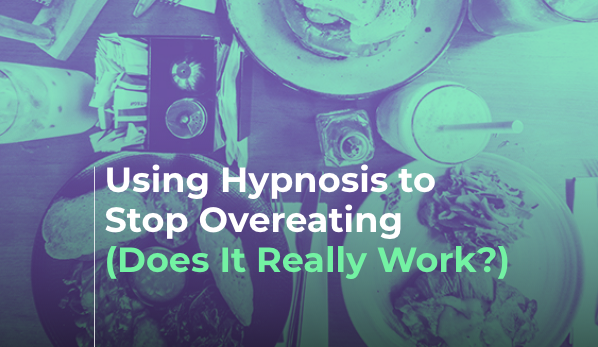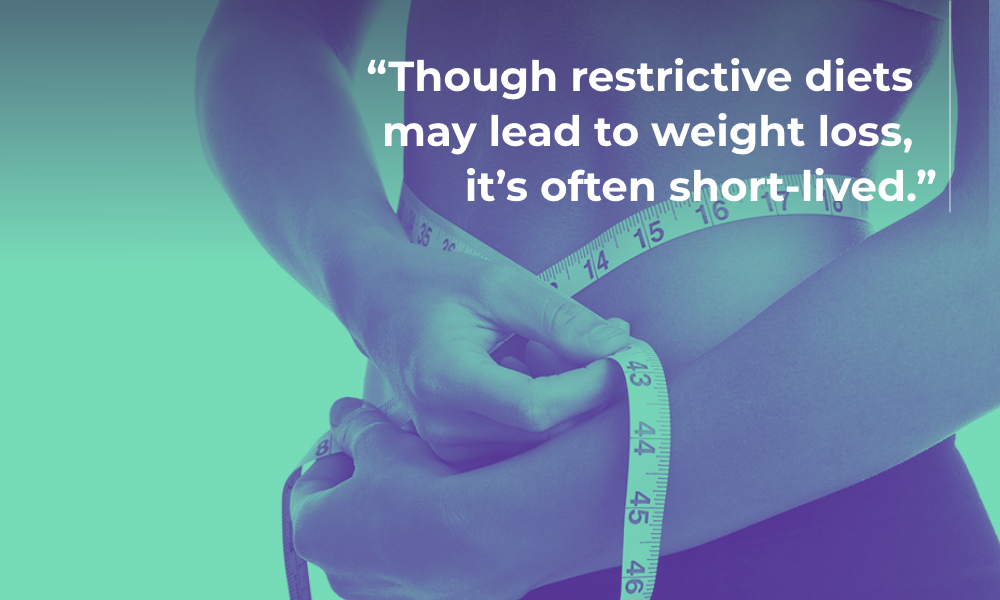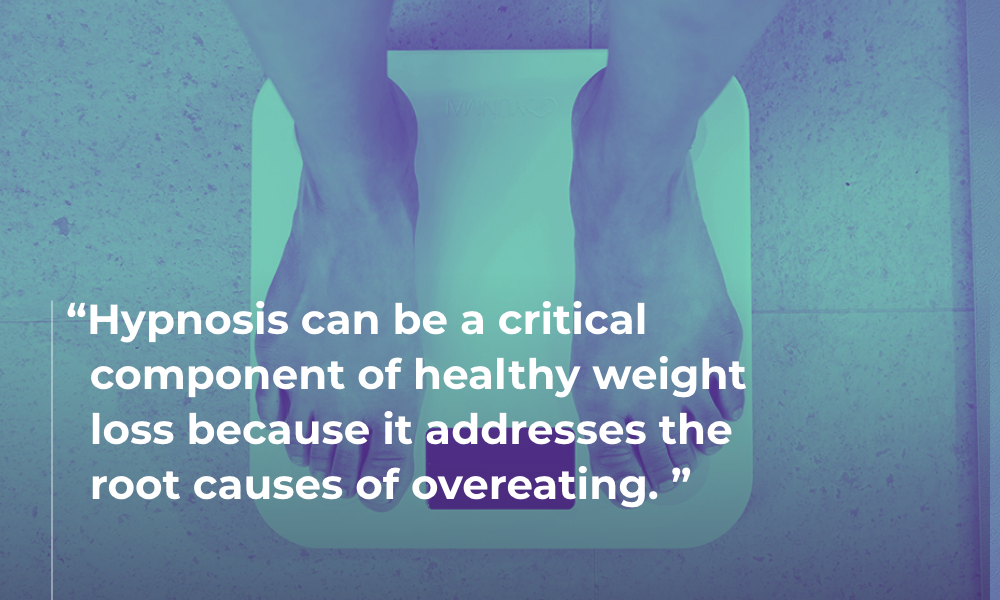If you struggle with overeating, you know that it can be debilitating. It’s a lot more than simply feeling a little guilty or nauseous after eating that extra piece of cake. Overeating can lead to a poor sense of self-worth and grave health conditions.
Those who struggle with overeating may look for ways to stop. They may try highly-restrictive diets or skipping meals entirely. But what they really need to do is to address the underlying psychological reasons they overindulge. This is where hypnosis for overeating can be an excellent tool. Keep reading to learn how hypnotherapy can help you address why you keep coming back for more.
In this article, we explore what overeating looks like, what might be causing you to do it, and its dangers. We also look at what hypnosis is and how it can be an effective way to help you stop overeating. Finally, we answer some of the questions you might have about hypnosis for overeating, like how effective it is, and what else you can do in addition to hypnosis to avoid the urge to overindulge. Let’s get started!
What is Overeating?
When you’re consuming more calories than your body needs to function, you may be overeating. Overeating can also include binge eating, which is characterized by eating excessively large quantities of food at once. It’s often accompanied by feelings of hopelessness and loss of control. Let’s take a look at some common causes of eating too much.
What Causes Overeating?
Each person is different, and so too is each person’s reason for overeating. However, there tend to be some common reasons that people overindulge.
Here are a few of them:
- Just like many of your other habits, overeating could be a learned behavior. If you grew up surrounded by people who tend to overindulge, it makes sense that you may tend to overindulge, too. Luckily, any behavior you’ve learned can be unlearned, and hypnosis is an excellent tool to help you do that.
- Whether you realize it or not, you may be using overeating to numb difficult emotions such as stress, jealousy, low self-esteem, or disappointment. This is often referred to as “emotional eating.” Many people use food as a defense mechanism or a stress reducer. To combat this, begin by bringing awareness to what compels you to eat to excess. If you find that you’re overeating to cope with difficult emotions—whatever their cause—consider seeking cognitive behavioral therapy, hypnotherapy, or both.
- Restrictive diets are nothing but trouble. Though restrictive diets may lead to weight loss, it’s often short-lived. In fact, one study showed that 80% of study participants who participated in a restrictive diet gained the lost weight back. Plus, these diets can lead to overeating. When you severely restrict what you eat, you tend to end up binging later! Instead of a diet that encourages you to eat unrealistically small food portions, focus on healthy eating and eating balanced meals throughout the day.
- You may also be portioning your meals incorrectly, leading to unintentional overeating. Even if you’re mostly eating healthy foods, you may overeat accidentally by serving yourself too-large portions of food. Speak with your healthcare professional about the correct proportions of food for you.
- You may be falling victim to unhealthy foods. If your diet is heavy in foods designed to be less satiating and more hunger-inducing, it may be harder for you to feel full. This includes junk food, like candy, potato chips, and ice cream.
- You might eat while you’re distracted. If you typically eat your meals while watching television, scrolling on your phone, or reading a book, the distraction may be causing you to overeat. Try eating mindfully, without any distractions for one week to see if it affects your eating habits.
- Drinking alcohol can also lead to overeating. Drinking makes it harder to monitor your body’s fullness and hunger signals. To avoid overeating while consuming alcohol, moderate your intake and drink plenty of water in between each alcoholic drink.
- For many people, simple boredom causes overeating. If you regularly find yourself eating for entertainment rather than because you’re hungry, start examining your motivations. Before you grab a snack, pause and ask yourself why you’re eating. It’s a-okay to eat food for pleasure once in a while. Just make sure you’re doing it as a conscious choice and not as a passive attempt to alleviate feelings of listlessness. This helps you develop a healthy relationship with food. If you do find that you’re eating out of boredom, try making a list of “boredom buster” activities to use instead of grabbing that bag of potato chips.
- Eating all of your meals on the run may cause overeating. It takes 20 minutes for your mind to register that you’re full, and when you’re rushing through meals, you’re likely to blow right past that hunger signal. Try scheduling at least half an hour for each meal throughout the day, so you can take your time.
- You may be focusing too heavily on losing weight. It’s important to know that the number on the scale is not a reliable indicator of your health. If you’re spending a lot of time working out, you may lose fat but gain muscle, which will cause your overall weight to go up. When you make your weight the primary metric of your health (or worse yet, your sense of self-worth), you’re likely to suffer some disappointments and setbacks. And ironically enough, those too can lead to emotional overeating.
The Dangers of Overeating
There are many dangers to overeating. The first, as you might expect, has to do with weight gain. Weight gain itself isn’t necessarily bad. But excessive weight gain can lead to a variety of dangerous health problems, including (but not limited to):
- Elevated blood pressure
- Stroke
- Coronary heart disease
- Type 2 diabetes
- Increased risk of some types of cancers
- Lowered immunity
Regularly overeating can also disrupt your circadian rhythm. This is your body’s internal clock. It regulates when you go to sleep at night and when you wake up in the morning. When it’s disrupted, you may have trouble falling and staying asleep. A disrupted circadian rhythm can also cause you to have poor quality sleep, struggle to wake up in the morning, or feel tired during the day.
Moreover, overeating can confuse your hunger signals, leading you to feel hungry when you’re not. This can perpetuate your habit of eating too often or too much.
Finally, regular overeating can lead to low self-esteem. As we’ve mentioned, overeating can cause you to feel as though you’ve lost self-control. Any time you don’t feel in control of your own actions, your sense of self and self-confidence may suffer.
What is Hypnosis?
Hypnosis is an effective solution for targeting overeating. But before we discuss how hypnosis works for overeating, let’s start by exploring what hypnosis is.
Hypnosis is an altered state of consciousness characterized by intense focus and full relaxation.
When you’re hypnotized, you’re not asleep or unconscious (although you are in a trance-like state, so you may appear to be asleep to an outside observer).
In this relaxed hypnotic state, your subconscious mind is more open to the positive suggestions that you hear. You’re better able to internalize these ideas and act on them than you are when you’re in your normal, day-to-day conscious state.
To get an idea of what hypnosis feels like, imagine the last time you were very absorbed in a book or a movie. When you were doing these activities, you likely blocked out any outside distractions and were fully focused on the information you were receiving. If you combine this feeling with a deep sense of relaxation, you have an idea of what hypnosis feels like.
Hypnosis is safe, scientifically-backed, and something you can control. Nobody can make you do anything you don’t want to do when you’re in a hypnotic state. In fact, hypnosis works best when you come to it with an open mind, believing that it will work.
Celebrities, athletes, and business executives frequently use hypnosis to lose weight, address their fears, and improve their performance.
How Hypnosis is Used for Overeating
Instead of zeroing in on the food you’re eating, hypnosis works by targeting the psychological reasons for overeating. Reasons may include trauma, damaging self-beliefs, or other deeply rooted negative feelings. Hypnosis helps you address these overeating triggers.
Hypnosis can help you internalize the belief that you are in control of your own eating habits (because in reality, you are)!
Hypnosis can also address overeating by:
- Raising your self-esteem so that you’re less likely to eat to numb painful feelings about yourself
- Helping you increase your self-awareness so that you don’t accidentally eat when you don’t want to (like out of boredom)
- Eradicating your unhealthy food cravings, which can help you eat healthier foods and eat them in moderation
- Helping you feel full sooner when eating, which reduces your desire to overeat
- Eliminating bad habits and patterns that lead to overeating, like drinking too much alcohol or eating absentmindedly
Hypnosis vs Diets for Overeating
Dieting may be effective for weight loss in the short term. But restricting your calorie intake won’t address the underlying issues that cause you to overeat. This often means that dieters who don’t do any psychological work return to their old eating habits, and they gain weight back in the process.
Diets only address the nutritional aspect of overeating. Hypnotherapy addresses the mental and emotional triggers that lead to consuming too much food. If you want to stop binge eating for good, hypnotherapy is likely a better solution than just dieting alone.
Frequently Asked Questions About Hypnosis for Overeating
If you’re new to hypnosis, you may have some questions. Here are the queries we get most often about hypnosis for overeating:
How Do You Break the Habit of Overeating?
There isn’t a one-size-fits-all approach to overeating. But, because overeating has a mental component for most people, almost everyone can benefit from hypnosis for overeating. Hypnosis makes an excellent complement to cognitive behavioral therapy (CBT) and other types of behavioral therapy to help you explore your reasons for overindulging.
When you’re trying to stop overeating, it’s also important to avoid over-restricting your food. Making certain foods completely off-limits or severely limiting your calorie intake is likely to result in binge eating down the road. Be gentle with yourself and allow yourself to consciously eat for pleasure within the context of a healthy diet.
When you’re eating, practice mindfulness. Instead of reading or watching television, focus on the foods you’re eating. This can feel uncomfortable at first, so a good trick is to focus on the feeling of the food. How does it taste? What’s its texture? Feel yourself chew and notice the muscles at work. Then direct your attention to everything that had to happen for the food you’re eating to arrive on your plate. Not only does this help you avoid zoning out and overeating, but it’s also an excellent gratitude practice. (And gratitude has a host of health benefits.)
If you determine that your overeating habit is partially or completely a result of stress or other overwhelming emotions, you may also want to incorporate meditation and breathwork into your daily routine. Of course, this will benefit your overall well-being, not just your eating habits.
It’s also critical to maintain a regular eating pattern and eating schedule. Be sure to eat slowly and chew your food thoroughly. Also, moderate your alcohol consumption—you may be “overeating” your calories through your cocktails!
How Successful is Hypnosis for Weight Loss?
Hypnosis can be a critical component of healthy weight loss because it addresses the root causes of overeating. Results are especially high when it’s used in conjunction with a nutritious diet, exercise, and—in some cases—behavioral therapy. In fact, studies show that hypnosis helps people keep off weight better than diet and exercise alone.
Like any goal you’re trying to achieve, you need to align your effort in all areas of your life. So if you’re going to weekly hypnosis sessions with a hypnotherapist, but stopping for a super-sized fast food meal on the way home, you’re not very likely to see results.
How Much Does Hypnosis Cost for Weight Loss?
The price for overeating hypnosis or weight loss hypnotherapy depends on a few things. First, you have to decide if you want to go to a hypnotherapist’s office, see a hypnotist online, or use a hypnosis app.
If you go the in-person route, the price depends on where your hypnotherapist is located. The expertise of the practitioner also determines their rate. Going this route will likely be an investment, but an investment worth making for your long-term health.
For those looking for a more affordable option, hypnosis apps are a cost-effective and convenient solution. Primed Mind is an app that delivers hypnotic primers designed to improve your performance. Plus, it is free to download.
Using Primed Mind to Stop Overeating
Many of the reasons you overeat likely have root causes that you may not even be aware of. They may range from learned behaviors in your youth to fears rooted deep in your subconscious. Regardless of the underlying reasons you overeat, hypnotherapy is an excellent tool to help you stop binge eating for good.
Thankfully, you don’t need to go into a hypnotist’s office to get the help you deserve. Primed Mind is easy to download on your tablet or smartphone from the comfort of your home (or wherever you happen to be). It uses hypnotherapy techniques to help you create positive behavioral patterns and encourage positive change in your life.
In 5 to 20 minute guided meditation sessions that are easy to incorporate into your wellness routine, you’ll learn to adopt positive habits that help you stop overeating in its tracks. Try our deep primer on nailing your nutrition goals or overcoming bad habits to get started!





